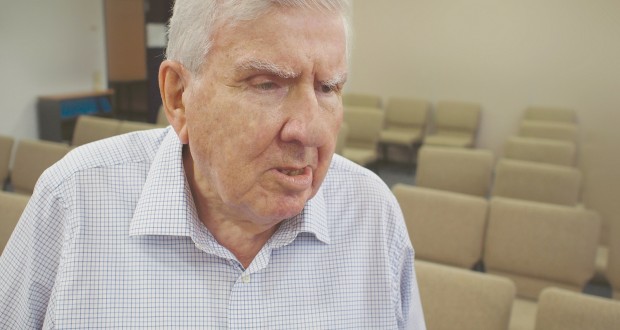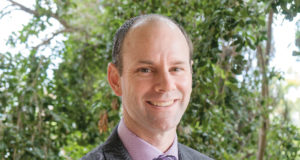As one of Australia’s largest providers of aged care services, the Uniting Church has a huge investment in ageing … and rightly so, given our demographic profile. John Harrison talks to an 84-year-old Uniting Church elder out to make a difference.
His febrile Twitter handle says it all: @EVERALDATLARGE. At 84 years of age, Aspley Uniting Church elder Everald Compton is a tireless advocate for older Australians. He’s particularly passionate about addressing the barriers seniors face in adapting to and adopting new technologies.
Not only a regular in the Twittersphere, he’s featured a few times in David Curnow’s Eat the week segment on 612 ABC local radio Queensland.
Last month, when Canberra was convulsed by Niki Savva’s book about the inner workings of the Abbott government and the prospect of a double dissolution, Everald was there for 37 meetings across three days with members of parliament from all parties. He wants them “to commit to a Minister for Longevity and upgrade of the age pension”.
In 2011 Everald was appointed by the Rudd government to head the Advisory Panel on Positive Ageing, with funding of $4.7 million over four years. In November 2013 Tony Abbott sacked the panel, six months before it finished its work, saying it was “not focused on the government’s policy priorities”. With help from the progressive think tank Per Capita, Everald set out to
raise the money to finish the job. Which he did.
Everald started out running fundraising campaigns for the Presbyterian Church in the 1950s. His first gig, at age 24, was St Andrew’s War Memorial Hospital. He subsequently ran over 1000 campaigns in 25 countries, and raised over two billion dollars (inflation adjusted).
Movers and shakers
Everald has mates right across the political spectrum, including former deputy prime minister and fellow train buff Tim Fischer, venture capitalist and philanthropist Mark Carnegie, former Gillard economic advisor Stephen Koukoulas, and Peter FitzSimons, former Wallaby now cheerleader for the republic.
Many of his mates will be on hand this month when he launches his latest venture, a novella about Flynn of the inland called The man on the twenty dollar note. The book is being launched first in Cloncurry at John Flynn Place and then in Brisbane, where philanthropist and QUT chancellor Tim Fairfax will do the honours, and the master of ceremonies will be former 4BC radio broadcaster Greg Carey. ABC television’s Landline has interviewed Everald for a feature on John Flynn.
It was Everald’s maternal grandfather Ernest Guhr who fostered his life-long fascination with trains. Everald has been the engine driver of the Melbourne to Darwin inland railway project, a standard gauge track running west of the Great Divide, serving the rich agricultural hinterlands of the eastern states.
As we know from the ABC television series Utopia, there is no overarching infrastructure plan for this nation.
As Everald tells it: “In preparing the (inland rail) business case, I contacted bureaucrats in the federal government and all state governments to ask for a copy of their infrastructure plans for the next 25 years. Not one of them had such a plan. Indeed, they were stunned that I asked for one. They merely followed the whims of politicians who invested in marginal seats from election to election.”
Will the inland rail line ever be built? Yes, inevitably, says Everald. The end of the mining boom means Australia is even more reliant on agriculture, as the food bowl of Asia. Agricultural communities are poorly served by transport infrastructure.
Everald is candid in his assessment of our political leaders. “Neither Howard nor Costello were interested in infrastructure,” he says.
Casually encountering Everald in the corridors of parliament last month, Prime Minister Malcolm Turnbull told him, “I’ve got the feeling you’ll live forever”. To which Everald replied, “If that’s your policy, then I’ll vote for you.”
Starting out
Joining the Commonwealth Bank after leaving school, Everald spent several years in Nyngan, western New South Wales, between Dubbo and Bourke. It confirmed his affinity with the bush, and every year he goes bush, “and these sojourns simply cause in my soul a longing desire to go back more often”.
The Presbyterian youth movement, the Presbyterian Fellowship of Australia (PFA), was central in Everald’s Christian formation. It was where he met his wife Helen (nee Wyllie). In the 1950s, Everald and Helen and their PFA mates canvassed the newly developing suburb of Aspley and rounded up enough Presbyterians to start the congregation that became St Phillip’s Presbyterian Church.
It was in the PFA in the late forties that he met Florence Gilmour, then a secretary in the Queensland Main Roads Department. Florence subsequently married a Lutheran member of parliament from Kingaroy. They kept in touch, and in the eighties Everald was asked to raise funds for the resurgent National Party’s Bjelke-Petersen Foundation, having previously successfully raised funds for the ALP’s Canberra headquarters, John Curtin House. Did Everald lose a bit of bark as a result of the association? “Yes, and no,” he says. “People on the other side of politics rang me up and said, ‘if you can raise money for those so and sos, then you can do it for us’.”
Not so well known is his involvement in the ending of apartheid in South Africa. In the mid-1980s Everald contracted to raise 10 million rand for the Progressive Federal Party (PFP), the multi-racial opposition party committed to ending apartheid. He brought PFP leaders Dr Frederik van Zyl Slabbert and Colin Eglin to Australia to meet church, political and community leaders 30 years ago.
These days, amid his myriad of public engagements and causes, Everald still finds himself at Aspley Uniting Church on Sundays. Mixed in with posts promoting four-year terms, dinner pix with Palmer Senator Dio Wang, and praise for fellow republican Peter FitzSimons, he tweeted on the fourth Sunday in Lent about the gospel reading from the lectionary: “Prodigal Son was lesson at #Church today. Our world exacts revenge & punishment while ignoring forgiveness. Time to reverse that human error.”
 JourneyOnline
JourneyOnline







